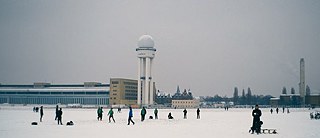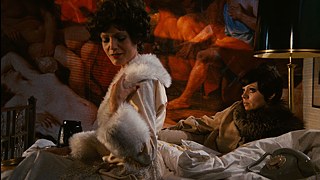MIFF 2018
Plunging into Germany’s filmmaking depths

For its 67th year, the Melbourne International Film Festival is set to take over the city’s cinemas with a diverse lineup of new and retrospective features, shorts, documentaries and virtual reality pieces. Among the 393-title 2018 program, German filmmaking boasts a link to 24 films; however MIFF’s lineup branches beyond the expected names and movies.
Of course, when certain German filmmakers unveil their latest efforts, all festivals take notice. For MIFF, that means Christian Petzold’s stunning Transit and Wim Wenders’ documentary Pope Francis: A Man of His Word both take centre stage. Coming to Melbourne after making their Australian premieres in Sydney, the pair of features represent two of the biggest films released by German directors this year, and from two of the nation’s best-known contemporary talents no less. One explores a war-torn love story and the transience that conflict causes. The other turns the camera on the most famous living religious figure in the world, as well as the institution he represents.
THE FAMILIAR PLAYERS
As part of MIFF’s Fashion and Film retrospective, Rainer Werner Fassbinder also graces the festival’s program via The Bitter Tears of Petra von Kant. One of the defining efforts of the prolific filmmaker’s career, it’s celebrated here for its costuming — which should come as no surprise given that its protagonist is a fashion designer. Still, where Fassbinder’s female-centric melodramas are concerned, there’s much to celebrate.
HORROR HIGHLIGHTS
Jumping from the horror of World War II to the horror film genre, MIFF also finds cinematic delights in Germany’s contribution to the latter — one in the anthology format that filmmakers never tire of using to spin frightening tales, the other in an account of witchcraft. With Austrian effort Goodnight Mommy proving one of the festival’s genre standouts in recent years, it’s hardly surprising that its Night Shift program once again opts for German-language scare-fests, this time courtesy of Field Guide to Evil and Hagazussa: Heathen’s Curse.In the former, Katrin Gebbe — whose Nothing Bad Can Happen screened at MIFF in 2013 — contributes to a feature that finds its unnerving basis in stories stemming from or toying with folklore and mythology. Her segment accompanies the latest work by Goodnight Mommy’s Veronika Franz and Severin Fiala, while German-Austrian co-production Hagazussa: A Heathen’s Curse stalks through alpine woods common to the region. Specifically, it sets its eerie narrative of persecution and isolation during a time troubled by the Black Plague and whispers of witchcraft.
LOOKING WITHIN
Another contingent amongst MIFF’s German lineup looks within the country in various ways, be it through a landmark in its capital, via a conversation between a noted German writer and a creative who has adopted the nation as his home, or in a family-friendly trek from the mountains back to the city. Central Airport THF stands out due to its name, with Berlin-based filmmaker Karim Aïnouz examining the current plight of the city’s Tempelhof Airport. Built during Hitler’s reign, it is now utilised as a refugee shelter — as well as, in stark contrast to its other uses, parkland for locals.Shut Up and Play the Piano charges a German filmmaker with a comparable task, in a fashion — looking at how a sliver of Germany became a beacon for those beyond its borders, this time through the career of musician Chilly Gonzales, who is presently based in Berlin. The documentary bases its exploration of Gonzales’ influence around a conversation between him and acidic German novelist Sibylle Berg, further linking the talent with his adopted residence.
Elsewhere, Mountain Miracle — An Unexpected Friendship is set firmly within Germany, turning its gaze inward to focus on a teenager traversing its landscape while tackling her adolescent troubles. 13-year-old Amelia has been sent to the mountains to treat her severe asthma, but is intent on returning home to Berlin until she hears about a mythical healing peak that may solve her problems.
LINKING WITH THE WORLD
From the remainder of the MIFF program that boasts German connections, the festival surveys a slate of cinema that connects Germany with the world. Fulldome effort Dimensions — Once Upon Our Reality peers upwards, as viewers will when it screens at the Melbourne Planetarium. The rest of the contingent directs their vision outwards through co-productions.
Then there’s the animated duo of Another Day of Life and Chris the Swiss, one based on a Polish reporter’s memoir charting his exploits during the 1975 Angolan civil war, the other the result of a Swiss filmmaker’s obsession with the death of her cousin in Croatia. And, from the festival’s retrospectives, The Wicker Man forms part of MIFF’s all-night Nicolas Cage marathon, remaking the 1973 horror film of the same name, while Kukurantumi — Road to Accra was shot by Ghanaian director King Ampaw as he returned home from Germany.
Last but by no means least, in Australian-German-UK co-production Island of the Hungry Ghosts, immigration comes to the fore. Winning Tribeca Film Festival’s Best Documentary prize for her efforts, first-time documentarian Gabrielle Brady contrasts two populations on Christmas Island: migrating crabs and those seeking asylum in Australia.
The Melbourne Film Festival runs from August 2 to 19, 2018.